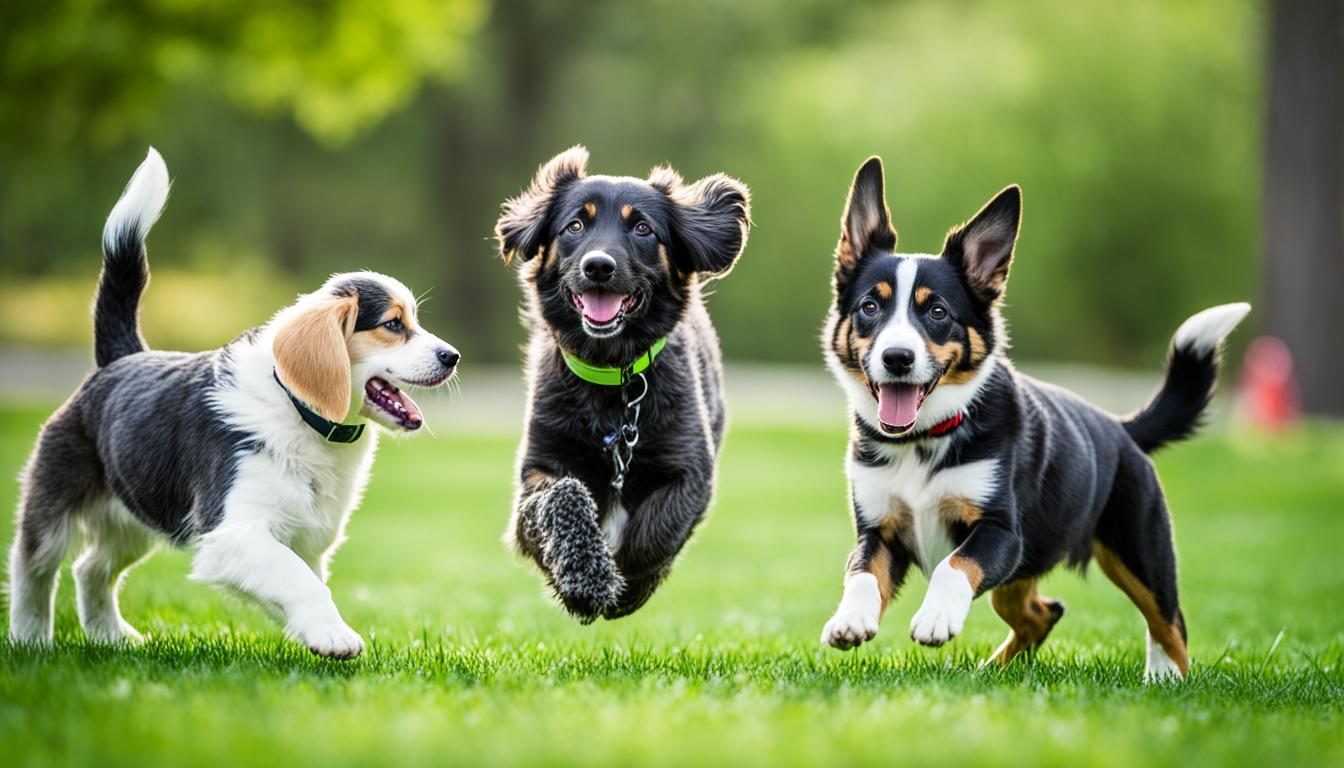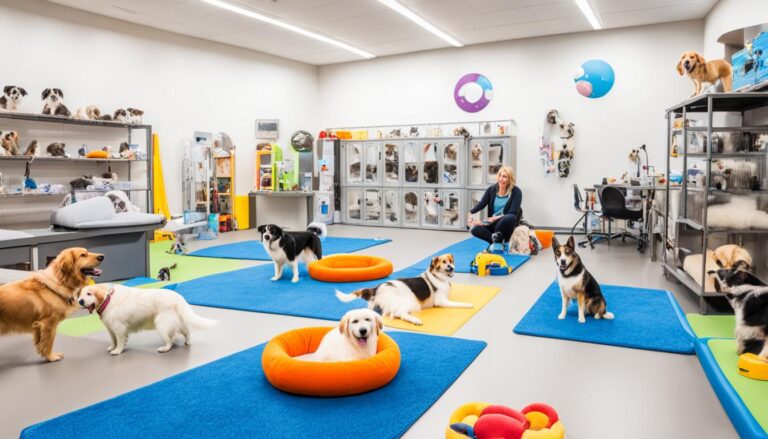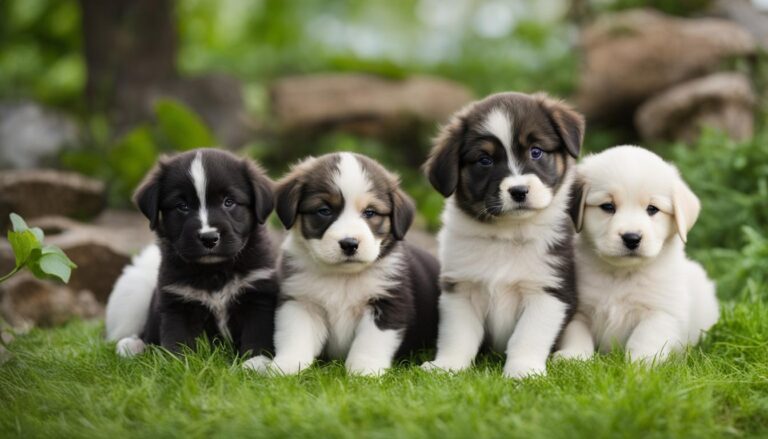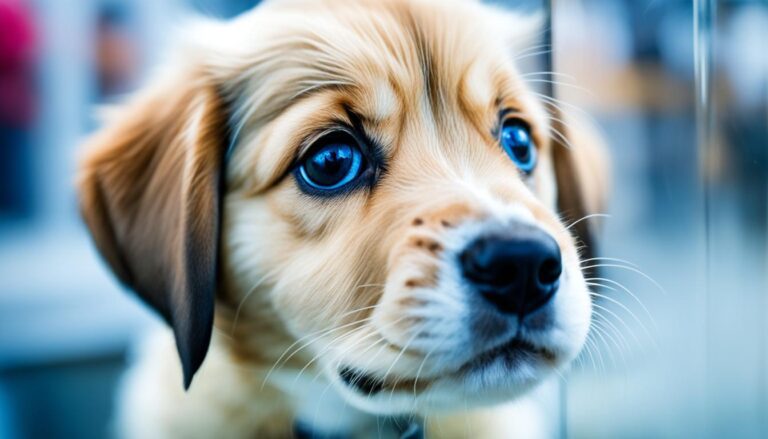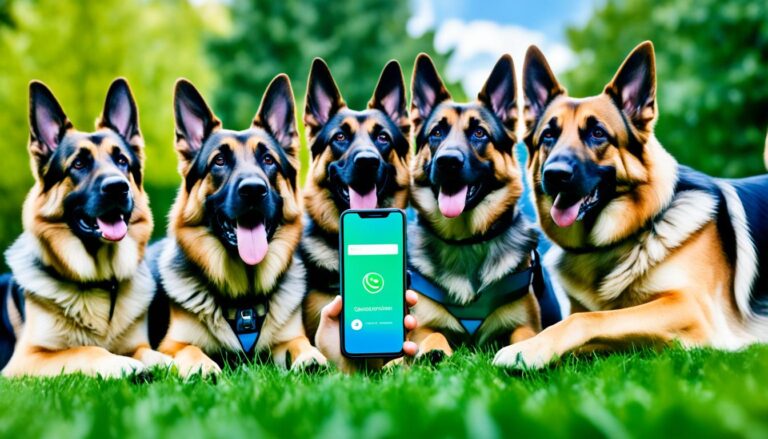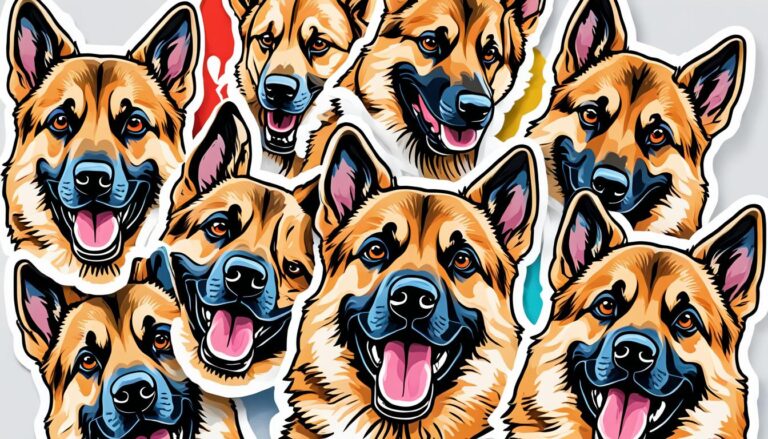Socializing Tips: Quite Good With Other Dogs Puppy
Welcome to our guide on socializing your puppy and helping them develop positive social skills with other dogs. Socialization is a crucial aspect of your puppy’s development and plays a significant role in their ability to interact well with other dogs throughout their lives. By starting the socialization process early and using positive reinforcement training techniques, you can ensure that your puppy grows up to be a well-adjusted and sociable adult dog.
Key Takeaways:
- Start socializing your puppy during their key “socialization window” before the age of four months.
- Be cautious during this time as their vaccinations may not be complete, and they could be at risk of catching a disease.
- Proper socialization requires effort, but it is worth it to have a happy and well-adjusted adult dog who gets along with other dogs.
- Puppy playdates are a great way to socialize your puppy and foster friendly interactions with other dogs.
- Gentle adult dogs can be valuable in teaching your puppy important lessons about play and socialization.
The Benefits of Puppy Playdates
Puppy playdates are a great way to introduce your puppy to other dogs and create friendly interactions. These playdates provide valuable opportunities for socialization, allowing your puppy to learn important lessons about play and develop essential social skills. Gentle adult dogs, often known as “nanny dogs,” can play a significant role in teaching your puppy how to interact with larger dogs and exhibit good manners.
During playdates, your puppy also gets to release their energy and engage in appropriate play behaviors, which can prevent undesirable behaviors like excessive mouthing. Playdates help tire out your puppy, resulting in a quieter and less teethy pet. It’s essential to find safe playmates and create a secure playdate environment to ensure that all puppies feel comfortable and have the chance to interact or take breaks as needed.
“Puppy playdates not only provide opportunities for socialization but also serve as a natural outlet for play and help puppies tire out, resulting in a quieter and less teethy pet.”
During playdates, it may be necessary to intervene at times to guide puppies in playing well together and manage any potential conflicts. Through guidance, positive reinforcement, and consistent interaction, puppies can build their friendship, refine their communication skills, and gain confidence. As puppies grow, the need for intervention decreases, and they develop the ability to resolve conflicts on their own.
Puppy playdates offer numerous benefits for your pet’s social development and overall well-being. They foster positive interactions with other dogs, teach crucial social skills, and provide an opportunity for your puppy to play and expend their energy in a safe and controlled environment. So, consider arranging playdates for your puppy and watch as they grow into a well-socialized, happy dog.
Tips for Successful Puppy Playdates:
- Find gentle adult dogs who enjoy interacting with puppies to join the playdates.
- Create a safe play environment with sufficient space and minimal distractions.
- Supervise playdates to ensure the puppies interact positively and manage any potential conflicts.
- Intervene if necessary to guide puppies in proper play manners.
- Provide treats and vocal praise to reinforce good behavior during playdates.
- Allow puppies to take breaks or rest when needed.
Tips for Socializing Your Puppy with Other Dogs and Humans
Socializing your puppy is an essential part of their development. It goes beyond simply introducing them to other dogs; it involves exposing them to various stimuli, such as different sights, sounds, and textures, in a positive and controlled manner. By providing enjoyable experiences through treats and praise, you can help your puppy build positive associations with new environments and experiences.
Involving different members of your family in the socialization process is crucial. By doing so, you ensure that your puppy becomes comfortable with various people and learns to interact with them in a friendly manner. Taking baby steps and avoiding overwhelming situations is important to prevent fear or anxiety in your puppy. Gradual exposure to new people and environments allows your puppy to develop confidence and build strong social skills.
Puppy classes can be a valuable resource for socialization. These classes not only provide opportunities for your puppy to learn basic obedience skills, but they also offer controlled environments for them to interact with other dogs and people. Consistent exposure to new situations and experiences even after the initial socialization window helps reinforce good behavior and keeps your puppy well-adjusted and confident.
Remember, socialization is an ongoing process that should continue throughout your dog’s life. A well-socialized puppy is more likely to grow up to be a behaved, relaxed, and sociable adult dog. By investing time and effort in training your puppy to be friendly with other dogs and teaching them to interact positively with humans, you are laying the foundation for a lifetime of good relationships and enjoyable experiences.
FAQ
What are some socialization techniques for puppies?
Some socialization techniques for puppies include exposing them to different sights, sounds, and textures in a positive manner, introducing them to a variety of people and environments, enrolling them in puppy classes, and providing treats and praise for positive experiences.
How can I train my puppy to be friendly with other dogs?
Training your puppy to be friendly with other dogs involves gradual introductions, positive reinforcement, and supervised playdates. It’s important to choose safe playmates and provide guidance during interactions to help them learn good manners and build confidence.
What are the benefits of puppy playdates?
Puppy playdates provide opportunities for socialization and friendly interactions with other dogs. They help puppies learn important lessons about play, build communication skills, and tire them out, resulting in a quieter and less mouthy puppy.
How can I teach my puppy to interact with other dogs?
Teaching your puppy to interact with other dogs involves providing positive experiences, setting up safe playdate environments, monitoring their interactions, and intervening if necessary to help them learn appropriate play behavior and manage conflicts.
How can I build good relationships with other dogs for my puppy?
Building good relationships with other dogs for your puppy involves gradually exposing them to other dogs, fostering positive experiences, and providing socialization opportunities in a controlled and supervised environment. Positive reinforcement and guidance during interactions are key.
When should I start socializing my puppy with other dogs and why?
It is important to start socializing your puppy during their key “socialization window” before the age of four months. This is when they are most receptive to new experiences and learning social skills. However, it is crucial to be cautious during this time as their vaccinations may not be complete and they could be at risk of catching a disease.
How can I socialize my puppy with humans?
You can socialize your puppy with humans by exposing them to different types of people, offering treats and praise for positive interactions, involving different family members in the socialization process, and gradually exposing them to different environments and experiences in a positive and controlled manner.
Is socialization a lifelong process for puppies?
Yes, socialization is a lifelong process for puppies. Continued exposure to new environments, experiences, and interactions helps reinforce good behavior and keeps your puppy confident and well-adjusted as they grow into adulthood.

